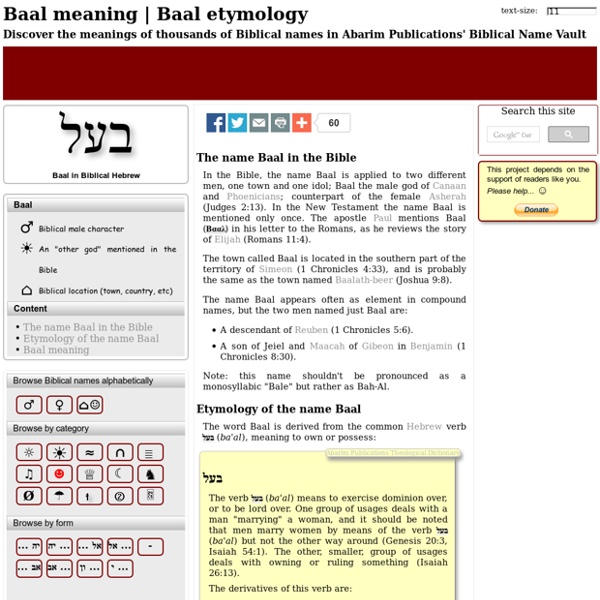



The name Abraham: meaning, origin and etymology באר בור ברר ברא ברה The small cluster of roots באר (b'r) and בור (bwr) and ברר (brr) are obviously related in form and meaning. For some curious reason, the root-verbs deal with either clearly declaring statements or else purifying items, while the derived nouns all have to do with water wells and pits and such. Scholars also identify two or three different root-verbs of the form ברא (br'), which seem to have nothing or very little to do with each other. It appears that the most basic idea that lies beneath all these verbal actions is a cutting, breaking or breaching, whether graving letters in stone, wells in the earth's surface, metals from ore, grain from stalks, the whole of creation in the expanse of nothingness, or a covenant between parties: באר The root-verb באר (ba'ar) "describes writing on tablets of stone made clear and distinct" (in the words of HAW Theological Wordbook of the Old Testament). בור ברר The derivations of this verb are: ברא I ברא II ברה I ברה II
The name Ishmael: meaning, origin and etymology The name Ishmael in the Bible There are a surprising six men named Ishmael in the Bible: The most famous Ishmael is the son of Abraham with Hagar. Because of rivalry between Hagar and Abraham's wife Sarah, Hagar and Ishmael are sent away and they end up in the Sinai desert where Ishmael becomes the father of a nation that exists of twelve tribes, just like Israel (Genesis 25:16). Etymology of the name Ishmael The name Ishmael consists of two elements. Abarim Publications Theological Dictionary שמע The root-verb שמע (shama') means to hear in much the same way as our English verb. This verb's derivations are: The masculine noun שמע (shema'), meaning sound (Psalm 150:5 only).The masculine noun שמע (shoma'), meaning tidings or report (Exodus 23:1, Isaiah 23:5).The feminine noun שמועה (shemu'a), meaning report (1 Samuel 2:24, Jeremiah 49:23), or mention (Ezekiel 16:56).The feminine noun השמעות (hashma'ut), a causative form, literally meaning that which is caused to be heard. אל אלה אל אלה
Thomas Young (scientist) Thomas Young (13 June 1773 – 10 May 1829) was an English polymath. Young made notable scientific contributions to the fields of vision, light, solid mechanics, energy, physiology, language, musical harmony, and Egyptology. He "made a number of original and insightful innovations"[1] in the decipherment of Egyptian hieroglyphs (specifically the Rosetta Stone) before Jean-François Champollion eventually expanded on his work. Young belonged to a Quaker family of Milverton, Somerset, where he was born in 1773, the eldest of ten children. Young began to study medicine in London in 1792, moved to Edinburgh in 1794, and a year later went to Göttingen, Lower Saxony, Germany where he obtained the degree of doctor of physics in 1796. In 1801 Young was appointed professor of natural philosophy (mainly physics) at the Royal Institution. Thomas Young died in London on 10 May 1829, and was buried in the cemetery of St. Young was highly regarded by his friends and colleagues.